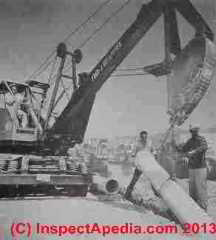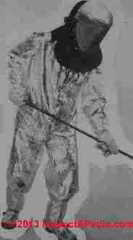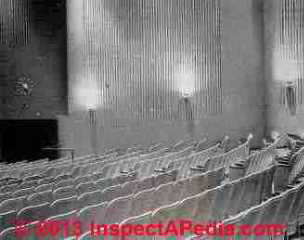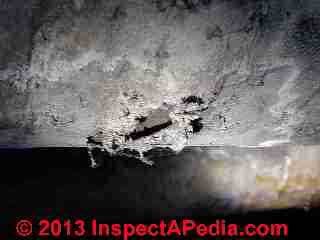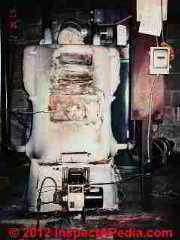 Asbestos Products & Markets
Asbestos Products & Markets
List of asbestos products & markets through 1959: History, Manufacture of Asbestos
- POST a QUESTION or COMMENT about what building materials may contain asbestos, visual identification of asbestos-containing materials in buildings, and possible asbestos material identification by testing, use, age, appearance
Asbestos products & applications: what types of products were made using asbestos, and what were the various industrial and private markets for asbestos materials? This article gives the history of and describes the various applications of use of asbestos.
We include an original table listing the wide range of asbestos-containing products across all areas and uses, and we link to a newer, more complete list of asbestos products & materials.
This articles series about the manufacture & use of asbestos-containing products includes detailed information on the production methods, asbestos content, and the identity and use of asbestos-containing materials. Our page top photo shows asbestos hardcast or paste insulation used on the exterior of a heating boiler.
InspectAPedia tolerates no conflicts of interest. We have no relationship with advertisers, products, or services discussed at this website.
- Daniel Friedman, Publisher/Editor/Author - See WHO ARE WE?
Asbestos Products and Markets In 1959
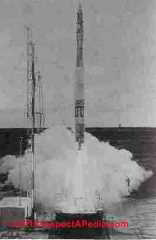 Basic and applied research and development programs
have been carried out for many years on asbestos materials
and their products. The consumption and sales of asbestos
as well as the diversity of its applications have been
steadily increasing.
Basic and applied research and development programs
have been carried out for many years on asbestos materials
and their products. The consumption and sales of asbestos
as well as the diversity of its applications have been
steadily increasing.
[Click to enlarge any image]
New mine deposits have been located and improved mining processes have been discovered.
These in turn have stimulated new product development. The future growth of the industry may be estimated from an analysis of the items in Table 1.7.
Table 1.7. Asbestos Applications [PDF] provides an extensive list of products that made use of asbestos.
A click on that document will then take the reader to a complete ASBESTOS LIST of PRODUCTS our expanded version of Rosato's original tables - an extensive, illustrated and cross-linked list of asbestos products.
A link there titled ASBESTOS PRODUCTS 1959 will return here - Ed.
Asbestos products are important contributors to the comfort and safety of mankind; they are also important base materials for our highly scientific and space age.
Materials exist for insulating the home, operating automobiles, reducing or eliminating fire hazards in industry and at home, protecting buildings, pipes and other items against corrosion and decay; the same materials service blast furnaces and steel mills, permit operation of and provide protection in electric power stations, provide fire resistant products on hoard ships, and help in the development and progress of missiles and aircraft.
See Figures 1.8 through 1.11 inclusive, shown at left and below.
Figure 1.8. The Vanguard satellite rocket (Cape Canaveral, Florida) shown at take-off. Asbestos parts include 6 1/2-ft. nose cone, electrical and thermal insulation, conduits etc. (Official U. S. Navy Photo)
Asbestos in Building Construction
Asbestos-cement products are widely used in commercial and industrial buildings and private homes.
Such products utilize the largest quantity of asbestos.
They include siding and roofing shingles, flat and corrugated sheets, and wall boards, all of which are now available in many different decorative colors.
Figure 1.9. Asbestos cement pipe. (Courtesy Johns-Manville Corp.)
Within recent years [1959] approximately one-half of all asbestos used in the United States was employed in the manufacture of asbestos-cement sheets, pipes and floor tile.
Another important item is millboard. This product is similar to cardboard in appearance but is much tougher and stronger.
Incombustible insulation boards are available in different colors. Another building material is asbestos-felted roof insulation; this material is generally combined with asphalt.
Figure 1.10 Aluminized asbestos fabric used in safety clothing for hot spots—furnace repair, coking, working white hot ingots, etc. (Courtesy Mine Safety Appliances Co.).
See ASBESTOS TEXTILES.
Asbestos filled plaster, stucco and paints provide fire resistance with low maintenance and good appearance.
In the hard-surface floor covering industry, asphalt and vinyl-asbestos tileshave helped to build a major industry. Now they account for approximately 29 per cent of the flooring market.
See details at ASBESTOS FLOOR TILES
Figure 1.11. Asbestos cement corrugated decorative wallboards. (Courtesy Johns-Manville Corp.)
Asbestos Textile Products
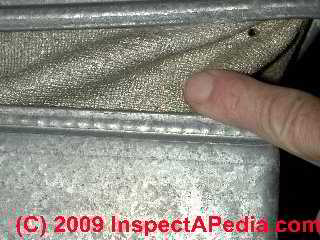 The original textile use of asbestos was in such woven products as coats, aprons, shoes, and gloves. Next came asbestos curtains for the theatre and for other public buildings. Now the textile uses are indeed diversified.
The original textile use of asbestos was in such woven products as coats, aprons, shoes, and gloves. Next came asbestos curtains for the theatre and for other public buildings. Now the textile uses are indeed diversified.
These uses include fire blankets, iron rollers, electrolytic cells, filters, linings for ovens and refrigerators and oven or dryer belts.
As illustrated by our photo, asbestos textiles were also widely used in HVAC systems to provide flexible, heat-resistant connections between the air handler and ductwork, functioning as a vibration dampener to avoid sending equipment noises into the building.
See ASBESTOS DUCT VIBRATION DAMPENERS.
Asbestos cloth continues to play an important part in the manufacture of woven brake linings, clutch plates, and related friction products. Asbestos yarn and cloth are important as reinforcing agents or fillers for gaskets and packings. S
uch diversified types of hinders as organic and inorganic resins and rubbers are used with asbestos to provide products which are resistant to high temperature, to chemicals, to high pressures and to steam.
Asbestos is incorporated in filters (woven or nonwoven form) and it is used to filter such products as dust, chemicals, blood, and viruses.
Asbestos Use in Heat Insulators
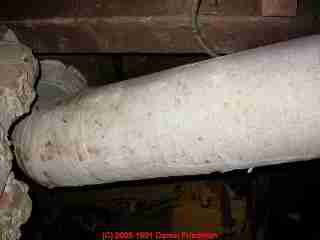
Asbestos fiber is used alone or in combination with other materials to produce temperature or electrical insulations. The heat insulators can be used to conserve fuel, eliminate overheating of areas, or protect other products from fire.
Such varied types of heat, insulators as millboard, molded shapes for pipes, other heat-generating units, and different grades of paper are manufactured.
At left: photo of asbestos paper insulation remaining on an HVAC air ducts - D. Friedman
Insulators for heat and sound generating units are made so that they provide maximum efficiency in these applications. These types of products contain a very small percentage of binder. Insulating material is also applied by spraying. Asbestos filled inorganic binders are predominantly used.
Asbestos paper (above left) and on occasion asbestos fabric (above right) was used to wrap the exterior of heating ducts and their connection to heating registers - Ed.. For details about asbestos cloth or fabrics or paper used in these applications see:
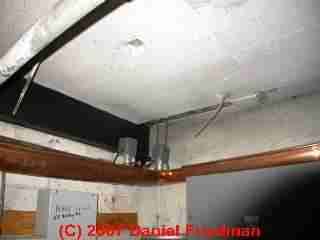 Asbestos filled thermal insulation is an essential part of modern equipment in most manufacturing plants. Such insulation applies to boilers, pipes, reactors, etc.
Asbestos filled thermal insulation is an essential part of modern equipment in most manufacturing plants. Such insulation applies to boilers, pipes, reactors, etc.
At left: photo of nearly pure tremolite asbestos panels attached to a commercial building ceiling to provide heat and fireproofing insulation - D. Friedman
These same plants may use asbestos electrical insulation on many of their cables and wires. This is clone so that when cables are overloaded and/or subjected to extreme high temperatures, the asbestos fiber will occupy space with relatively no loss in density or bulk.
Where high electrical insulation value is required andextremely thin paper products are required, asbestosproducts find good application. Extremely thin papersheets which are composed of nonmagnetic contaminants are available.
Some general applications of asbestos products in theelectrical industry include conduit coverings, spark arrestors,battery boxes, armature windings, bus bars, motor slot wedges and other parts requiring good electrical properties and high temperature resistance.
Asbestos Use in Motors and Engines
Nonwoven asbestos is extensively used in brake linings, clutch facings, packings, and gaskets. Asbestos filled plastics have found applications in such varied automotive or motor parts as heaters, electrical units, bearings, washers, etc. Such varied fillers as metals, graphite, sisal, and glass, in addition to asbestos are frequently used.
Typical mass produced asbestos filled phenolic parts are distributor covers and rotors.
Another application for asbestos is in lubricants to give solidity and to regulate the melting temperature or the rate of flow.
...
Continue reading at ASBESTOS LIST of PRODUCTS, or select a topic from the closely-related articles below, or see the complete ARTICLE INDEX.
Or see these
Recommended Articles
- ASBESTOS LIST of PRODUCTS - complete list,
- ASBESTOS ORIGIN & PROPERTIES
- ASBESTOS IDENTIFICATION IN BUILDINGS - home
Suggested citation for this web page
ASBESTOS PRODUCTS 1959 at InspectApedia.com - online encyclopedia of building & environmental inspection, testing, diagnosis, repair, & problem prevention advice.
Or see this
INDEX to RELATED ARTICLES: ARTICLE INDEX to ASBESTOS HAZARDS
Or use the SEARCH BOX found below to Ask a Question or Search InspectApedia
Ask a Question or Search InspectApedia
Try the search box just below, or if you prefer, post a question or comment in the Comments box below and we will respond promptly.
Search the InspectApedia website
Note: appearance of your Comment below may be delayed: if your comment contains an image, photograph, web link, or text that looks to the software as if it might be a web link, your posting will appear after it has been approved by a moderator. Apologies for the delay.
Only one image can be added per comment but you can post as many comments, and therefore images, as you like.
You will not receive a notification when a response to your question has been posted.
Please bookmark this page to make it easy for you to check back for our response.
IF above you see "Comment Form is loading comments..." then COMMENT BOX - countable.ca / bawkbox.com IS NOT WORKING.
In any case you are welcome to send an email directly to us at InspectApedia.com at editor@inspectApedia.com
We'll reply to you directly. Please help us help you by noting, in your email, the URL of the InspectApedia page where you wanted to comment.
Citations & References
In addition to any citations in the article above, a full list is available on request.
- Rosato, D.V., Asbestos, its Industrial Applications, D.V. Rosato, engineering consultant, Newton MA, Reinhold Publishing Co., NY, 1959, Library of Congress Catalog No. 59-12535. Excerpts & adaptations are found in InspectApedia.com articles on asbestos history, production & visual identification in and on buildings.
Re-printed online with additional annotations, photos, and information, beginning at
ASBESTOS, ITS INDUSTRIAL APPLICATIONS, ROSATO 1959 - Asbestos Strategies, Lessons Learned about Management and Use of Asbestos: Report of Findings and Recommendations on the Use and Management of Asbestos, 16 May 2003, US EPA, web search 01/20/2011, original source: http://www.epa.gov/asbestos/pubs/asbstrategiesrptgetf.pdf
prepared by the: Global Environment & Technology Foundation, 7010 Little River Turnpike, Suite. 460, Annandale VA 20003 - Other US EPA Publications on asbestos: web search 01/20/2011, see http://www.epa.gov/asbestos/pubs/pubs.html
- In addition to citations & references found in this article, see the research citations given at the end of the related articles found at our suggested
CONTINUE READING or RECOMMENDED ARTICLES.
- Carson, Dunlop & Associates Ltd., 120 Carlton Street Suite 407, Toronto ON M5A 4K2. Tel: (416) 964-9415 1-800-268-7070 Email: info@carsondunlop.com. Alan Carson is a past president of ASHI, the American Society of Home Inspectors.
Thanks to Alan Carson and Bob Dunlop, for permission for InspectAPedia to use text excerpts from The HOME REFERENCE BOOK - the Encyclopedia of Homes and to use illustrations from The ILLUSTRATED HOME .
Carson Dunlop Associates provides extensive home inspection education and report writing material. In gratitude we provide links to tsome Carson Dunlop Associates products and services.


